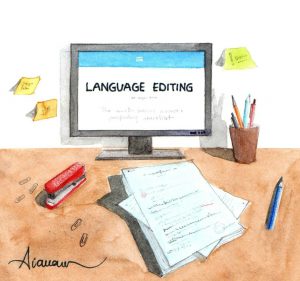 Fill in the blanks: “Instead of reading this, I should be______”. Yes, you’re probably procrastinating: postponing doing what you should be doing only to do other things, useful or useless.
Fill in the blanks: “Instead of reading this, I should be______”. Yes, you’re probably procrastinating: postponing doing what you should be doing only to do other things, useful or useless.
Procrastination is not the same as laziness, which is the lack of action. Procrastination is often packed with action. And when you’re a PhD student, procrastination disguises itself as busywork—what looks like work, feels like work, but is not useful work—more often than you think. Here’s an example of how a PhD student procrastinates.
The vicious circle of procrastination
How does a PhD student procrastinate?
You should be working on the first draft of your paper. You should and you will, you say to yourself. You sit down at your desk, open a new file in your word processor, and start writing an outline of your research paper: Abstract, Introduction…References, Appendix.
Wait! Where did you put those graphs you need to include in the appendix? Here they are. But will your sponsor agree to publish them? You email Amy, your PhD advisor, to ask.
Talking about Amy, you never finished reading her latest article, which you need to cite in your paper. You can’t remember where you’ve put your copy, so you log in to ResearchGate.
With the information fresh in your mind, wouldn’t it be good to highlight the important sections of Amy’s paper so that you can retrieve them later? You print the paper and grab a highlighter. A new one, from the set you just bought on Amazon. Amazon…No, you’ll shop for a bike lock later. You first need to print that paper. Focus!
In this digital age, printing feels like a luxury. But it’s so useful, because reading on screen gives you eye strain. Since you’re printing, it makes sense to print all the other papers you need, to save time later. Done.
Now you need to staple them. At least the stapler’s not out of staples—refilling it would waste your time.
With all those papers printed and stapled, you’ll need some folders, too. You borrow a few from your co-worker. You’re sorry but you’ll help him with his presentation later; now you’re busy. He understands.
You start filing your papers in alphabetical order—no, by topic. Done. Now it would be good to label those folders, too. Where’s the label maker you got for your birthday but never had the chance to use till now? It’s just there, in the drawer. In two minutes you’ve created professional-looking labels for your folders. Nice touch!
Okay, you might have wasted a bit of time, but you’ll recoup. Now, you only need to tidy up your desk: Of course you can’t work in such a mess; it’s distracting. Yes, it’s just become the perfect work space. It really feels like your ideas are in order, too.
Now it’s really time to write. You just need a cup of coffee first, and since the coffee machine is just next to the library, you’ll return those overdue books. You’ve just killed two birds with one stone—that’s efficiency.
You got all your papers organized and your cup of coffee sits on your desk—everything you need to write your paper is at your fingertips. It feels good, so you start writing. After completing half a page, you stop: the document would look so much better if it was formatted…
That’s how one PhD student procrastinates. It’s not all fiction, I’m afraid.
Researchers say procrastination affects one in two students, but I wonder how many PhD students; my bet is more than 50 percent.
How PhD students can beat procrastination
Trying to help you beat procrastination is beyond the scope of this post, which is only meant to make you smile. Jokes aside, procrastination can be a serious problem if it often interferes with your PhD work and makes you miss deadlines. Psychologists are studying the causes of this behavioral problem and proposing solutions.
One thing that helped me improve my time management when I was writing my PhD thesis is the Pomodoro technique. You work for 25 minutes, but really focus on what you’re doing, and then take a short break. Then you work again for 25 minutes, take a break, and so on.
I cannot help you avoid procrastination, but I can help you edit or proofread your PhD thesis or research paper. Send me a message at editor@languageediting.com so we can discuss your project.
Related posts:
- Academic editing tips I wish I knew as a research scientist
- Should you quit your PhD?
- How I wrote my PhD thesis in three months
